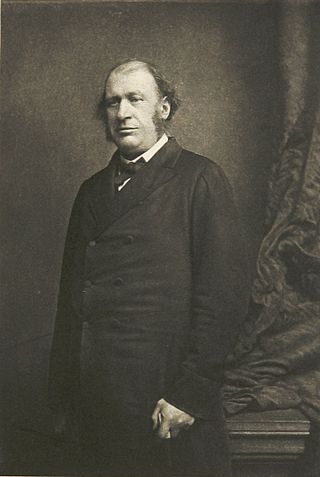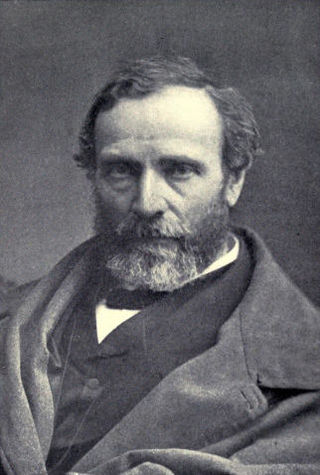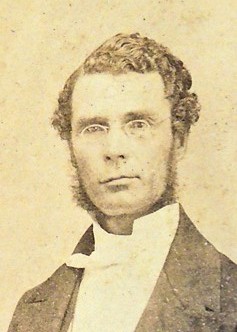Life
The son of Thomas Finlason of Camberwell, Surrey, he entered the Middle Temple on 5 January 1841, and for some years practised as a special pleader under the bar, reporting also for several years, as a member of the parliamentary corps of The Times in the Strangers' Gallery of the House of Commons. He was called to the bar on 21 November 1851, and joined the south-eastern circuit. [1]
Finlason was a voluminous writer on legal subjects, and for nearly half a century he held the post of chief legal reporter for The Times. He recorded the cases tried in the Court of Queen's Bench. [1]
A Roman Catholic convert of 1849, at the hands of Frederick William Faber, Finlason wrote for The Rambler and Dublin Review . He was a Catholic apologist, defender of John Henry Newman, and opponent of Whig historians. [2]
Although only a "stuff-gown man" (junior barrister), Finlason was appointed one of the masters of the bench of the Middle Temple. He died on 11 March 1895 at his residence, 12 Campden Hill Road, Kensington, London. [1]

The Judicial Committee of the Privy Council (JCPC) is the highest court of appeal for the Crown Dependencies, the British Overseas Territories, some Commonwealth countries and a few institutions in the United Kingdom. Established on 14 August 1833 to hear appeals formerly heard by the King-in-Council, the Privy Council formerly acted as the court of last resort for the entire British Empire, other than for the United Kingdom itself.
The following outline is provided as an overview of and introduction to law:

His Majesty's Most Honourable Privy Council is a formal body of advisers to the sovereign of the United Kingdom. Its members, known as privy counsellors, are mainly senior politicians who are current or former members of either the House of Commons or the House of Lords.

Sir James Fitzjames Stephen, 1st Baronet, KCSI was an English lawyer, judge, writer, and philosopher. One of the most famous critics of John Stuart Mill, Stephen achieved prominence as a philosopher, law reformer, and writer.

Paul Bogle was a Jamaican Baptist deacon and activist. He is a National Hero of Jamaica. He was a leader of the 1865 Morant Bay protesters, who marched for justice and fair treatment for all the people in Jamaica. After leading the Morant Bay rebellion, Bogle was captured, tried and convicted by the colonial government, and hanged on 24 October 1865 in the Morant Bay court house.

Edward John Eyre was an English land explorer of the Australian continent, colonial administrator, and Governor of Jamaica.

The Morant Bay Rebellion began with a protest march to the courthouse by hundreds of people led by preacher Paul Bogle in Morant Bay, Jamaica. Some were armed with sticks and stones. After seven men were shot and killed by the volunteer militia, the protesters attacked and burned the courthouse and nearby buildings. Twenty-five people died. Over the next two days, poor freedmen rose in rebellion across most of St. Thomas-in-the-East parish.

Arthur Hobhouse, 1st Baron Hobhouse, was an English lawyer and judge.

George William Gordon was a Jamaican businessman, magistrate and politician, one of two representatives to the Assembly from St. Thomas-in-the-East parish. He was a leading critic of the colonial government and the policies of Jamaican Governor Edward Eyre.

George Cornelius Gorham (1787–1857) was a priest in the Church of England. His legal recourse to being denied a certain post, decided subsequently by a secular court, caused great controversy.
His or Her Majesty's Privy Council in Ireland, commonly called the Privy Council of Ireland, Irish Privy Council, or in earlier centuries the Irish Council, was the institution within the Dublin Castle administration which exercised formal executive power in conjunction with the chief governor of Ireland, who was viceroy of the British monarch. The council evolved in the Lordship of Ireland on the model of the Privy Council of England; as the English council advised the king in person, so the Irish council advised the viceroy, who in medieval times was a powerful Lord Deputy. In the early modern period the council gained more influence at the expense of the viceroy, but in the 18th century lost influence to the Parliament of Ireland. In the post-1800 United Kingdom of Great Britain and Ireland, the Irish Privy Council and viceroy Lord Lieutenant had formal and ceremonial power, while policy formulation rested with a Chief Secretary directly answerable to the British cabinet. The council comprised senior public servants, judges, and parliamentarians, and eminent men appointed for knowledge of public affairs or as a civic honour.
Edward Lowth Badeley was an English ecclesiastical lawyer and member of the Oxford Movement who was involved in some of the most notorious cases of the 19th century.
The nominate reports, also known as nominative reports, named reports and private reports, are the various published collections of law reports of cases in English courts from the Middle Ages to the 1860s.

Sir Edward Hyde East, 1st Baronet was a British Member of Parliament, legal writer, and judge in India. He served as chief justice of Calcutta from 1813 to 1822. He was the first Principal of Hindu College. Hyde East was a prominent slave-owner in Jamaica, where he was born.

Dr John Epps was an English physician, phrenologist and homeopath. He was also a political activist, known as a champion of radical causes on which he preached, lectured and wrote in periodicals.

Sir William Milbourne James, was a Welsh barrister and judge. A Chancery specialist, he was appointed to the Court of Chancery of England in 1869. The next year, he was appointed Lord Justice of Appeal in Chancery, as well as a member of the Privy Council, serving until his death in 1881.

The judiciary of Jamaica is based on the judiciary of the United Kingdom. The courts are organized at four levels, with additional provision for appeal to the Judicial Committee of the Privy Council in London. The Court of Appeal is the highest appellate court. The Supreme Court has unlimited jurisdiction in all cases, and sits as the Circuit Court to try criminal cases. The Parish Court in each parish hears both criminal and civil cases, excluding grave offences. The Petty Sessions are held under Justices of the Peace, with power to hear minor crimes.
![]() This article incorporates text from a publication now in the public domain : Lee, Sidney, ed. (1901). "Finlason, William Francis". Dictionary of National Biography (1st supplement). Vol. 2. London: Smith, Elder & Co.
This article incorporates text from a publication now in the public domain : Lee, Sidney, ed. (1901). "Finlason, William Francis". Dictionary of National Biography (1st supplement). Vol. 2. London: Smith, Elder & Co.










